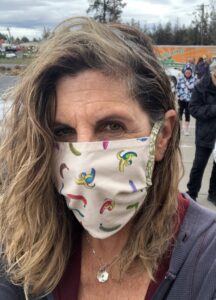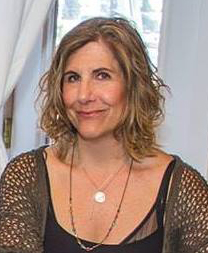 I haven’t felt this anxious in a long time and I’m trying to be okay with that.
I haven’t felt this anxious in a long time and I’m trying to be okay with that.
There is absolutely nothing easy about what’s going on in our world and country right now. While we all have different perspectives and ways of coping, minding our minds feels incredibly challenging these days and more important than ever. The pandemic, injustice, violence and political divide are wearing us down.
When my husband Mark and I first started working on the Mind Your Mind Central Oregon project, we kicked off the outreach campaign with some market research. We initiated a phone survey that included responses from 300 people in each of our three counties. We held informal focus groups in Crook, Deschutes and Jefferson counties, inviting neighbors from LaPine, Warm Springs, Sisters and Redmond. Our goal was to learn what everyday mental health and wellness means to our neighbors. One thing that has stuck with me from the focus group conversations was this common theme: minding our minds doesn’t mean feeling happy all of the time. It’s about learning how to cope with life’s everyday challenges and the common depression and anxiety that come with being human.
That was important for me to hear, because I’m not very good at being emotionally uncomfortable. I live a pretty charmed life and despite my family history of severe mental illness, I got lucky genetically. While I’ve experienced a decent amount of anxiety throughout most of my life, my occasional bouts with mild depression (including postpartum) have been manageable. Partly because I’ve leaned on talk therapy and low-dose antidepressants for more than half of my life. I’ve tried life without antidepressants several times, and I simply feel more myself when I take them. I have friends who’ve tried antidepressants and feel the opposite. They feel less themselves and would rather ride life’s ups and downs without added chemistry. I respect that decision and also believe that managing mental health without medication works better for some than others.
I’ve learned that brain chemistry works in many of the same ways as body chemistry. When you have diabetes, high blood pressure or cholesterol, you have the option of making lifestyle changes and taking medications that help you balance the chemicals your body might be over or under producing. Same goes for our brains — which are organs just like our livers, kidneys, hearts and lungs (check out the Mind Your Mind Central Oregon website page on Brain Science for more information). So for me, antidepressants make me feel more comfortable emotionally. But clearly they don’t eliminate emotional discomfort completely because I’ve been feeling pretty uncomfortable lately. With so much going on, I’ve been reminding myself that it’s normal and important to allow myself to sit with this discomfort for a while (thanks MYMCO focus group peeps). It would be strange if I wasn’t feeling affected by current events.
In the spirit of coping with ups and downs, here are five things I’ve been exploring to get me through some of the discomfort, while still being proactive and productive.
Having difficult and respectful conversations
Instead of fuming about Facebook posts that conflict with my personal beliefs or ranting through my own posts, I’m making an effort to reach out directly to friends and family members to share my perspectives, and also listen to theirs with an open heart and mind. I’ve been pleasantly surprised at how well those conversations are going. No, we’re not changing each other’s minds, but we are finding more common ground than I expected. We are sharing more rational and respectful dialogue than we do when we’re hiding behind the shield of social media.
Supporting local businesses
Mark and I have started to ease carefully and safely back into our community by picking up food from locally owned restaurants, sitting outside for a beverage, or buying gifts in town instead of shopping online. That connection to the businesses that make Central Oregon feel like home is important. We’ve missed it.
Supporting people and causes
Finding ways to support community or causes we believe in always feels healing. The pandemic is taking its toll on both businesses and nonprofits. Donating time and money can make a difference, even in small doses.
In Central Oregon, several Pandemic Partner Facebook community groups have formed to help us find ways to take care of each other:
Pandemic Partners South Deschutes County
Pandemic Partners Jefferson County
You can also find local volunteer opportunities in Crook, Deschutes and Jefferson counties through Volunteer Central Oregon.
Exercising
I know this sounds cliché, but exercise (strength training and cardio) are more important to me now than ever before. The new reality of my work has me staring at my computer screen consistently throughout the day. Taking breaks to get my body and heart moving helps clear my head and refresh my energy.
Eating delicious, healthy food
Here’s another one we hear often, but I try to add a few handfuls of colorful veggies, some lean protein and healthy fat to every meal. Eating slowly (especially when I’m anxious and busy) is really hard but incredibly helpful. It’s amazing how much better I feel when I eat clean and slowly.
In some of my older blogs for Mind You Mind Central Oregon, I talked about how I was trying to have my first cup of coffee before scrolling the news. I talked about how I was trying to keep my phone out of the bedroom at night. Lately, I’ve fallen back into some old bad habits. My phone is back by the bed. News headlines are the last thing I look at before I go to bed and the first thing I look at when I wake up. I’m trying to find balance between staying informed and minding my mind. Thanks to a suggestion from a friend, I’ve deleted the Facebook app from my phone. I can still check in when I’m at my desk, but I’m no longer scrolling the feed as regularly, which seems to help me keep my anxiety in check.
I’ll finish with this. Sometimes it’s okay to feel “not okay”. Still, we can take positive steps to get through difficult times. We’d love to hear from you with more ideas or stories about how you mind your mind.
Thanks for checking in and stay safe and well.
 Linda Quon is Vice President and Director of Communication at Quon Design and Communication. Linda is working to promote everyday mental health awareness in partnership with Deschutes County Health Services and Central Oregon Health Council — which includes providers and health advocates from Crook, Jefferson, and Deschutes Counties. Linda was born and raised in Southern California and moved to Central Oregon with her husband and two children in 2005. Her mother lived with Schizophrenia and bi-polar disorder and her oldest brother also experienced bi-polar disorder. With support from family, friends, therapists and primary care providers, Linda has been navigating the world of mental illness most of her life — including her own struggles with mild anxiety and depression. Linda is proud to work as an advocate for mental health and a blogger for Mind Your Mind Central Oregon.
Linda Quon is Vice President and Director of Communication at Quon Design and Communication. Linda is working to promote everyday mental health awareness in partnership with Deschutes County Health Services and Central Oregon Health Council — which includes providers and health advocates from Crook, Jefferson, and Deschutes Counties. Linda was born and raised in Southern California and moved to Central Oregon with her husband and two children in 2005. Her mother lived with Schizophrenia and bi-polar disorder and her oldest brother also experienced bi-polar disorder. With support from family, friends, therapists and primary care providers, Linda has been navigating the world of mental illness most of her life — including her own struggles with mild anxiety and depression. Linda is proud to work as an advocate for mental health and a blogger for Mind Your Mind Central Oregon.
